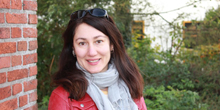Inaugural lecture Ms. Prof. D. Başkent: Super ears
| When: | Tu 15-04-2014 at 16:15 |
| Where: | Academiegebouw, Broerstraat 5, Groningen |

Inaugural lecture: Ms. Prof. D. Başkent
Title: Super ears
Chair: Auditieve perceptie
Faculty: Medical Sciences
A grandmother who is asked if they would like to have a berry cake answers: "I do not have belly ache!" This misunderstanding could be harmless by itself, and may even produce chuckles in a warm family environment. However, in reality, hearing impairment is not a simple health problem of sensory deprivation only; its consequences can be devastating. Hearing impairment can disrupt oral communication, the very tool that keeps humans connected to each other, and can eventually lead to social isolation and depression.
Advanced technological and clinical tools do offer solutions, in terms of hearing devices. These approaches have been very successful, in particular, in the case of cochlear implants, which help deaf people regain the hearing function. Yet, the implantation outcome can drastically vary from one person to another, and the sound quality through the device needs much improving.
How can we find solutions to achieve better restoration of hearing? And while at that, why not aim for "super ears"? First we have to acknowledge that hearing is a complex neurological process and hearing impairment is a complex health problem. One has to take into account varying demographics, etiology, and conditions of individual patients, and further, understand the interactions of sensory deprivation with other factors, such as aging, cognitive and psychological well-being, and quality of life. Understanding this complexity will require teamwork, an efficient collaboration between clinicians, scientists, and patients, as well as between industry, academia, and institutions. Only then, we can offer the sophisticated tools to help the grandmother to have her cake, and eat it too, while enjoying all the pleasures of hearing the rich range of everyday sounds, such as the laughters of grandchildren.
